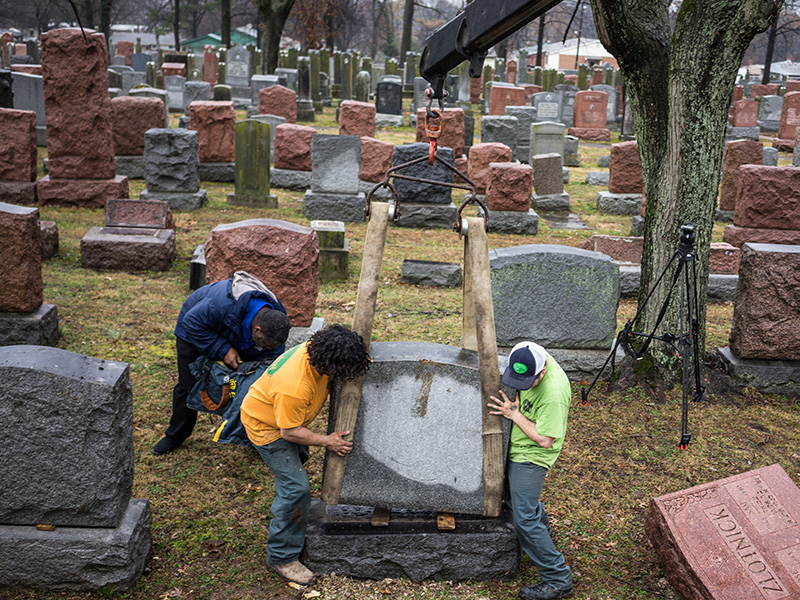In the wake of a string of violence against Jews in the United States, including bomb threats at Jewish community centres and acts of vandalism at cemeteries, the security situation in the Canadian Jewish community has not changed, assures the Centre for Israel and Jewish Affairs (CIJA).
“There is no indication of a credible threat, and all incidents that have occurred within the U.S. and Canada have been unfounded and intended to cause fear but not injury,” CIJA said in a Feb. 28 mailing to communal professionals.
The Canadian Jewish community’s “best and most direct response lies in remaining calm, prepared, and vigilant,” CIJA added.
Canada has not been immune from recent attacks against Jews, however. In late January, the London, Ont., JCC was evacuated after a bomb threat was phoned in. Nothing was found following a police sweep.
READ: CALGARY JCC RECEIVES BOMB THREAT, EVACUATED
The same thing happened Feb. 27 at the Calgary JCC.
Ryan Hartman, director of CIJA’s national community security program, said Jewish federations in Toronto, Ottawa Montreal, Vancouver, Calgary and other centres have been in touch with local police forces to stress the need for added security at communal facilities.
“We have received an excellent response from Canadian law enforcement agencies and they have been very responsive to these concerns,” Hartman said.
The response has included offers of direct support, such as professional advice to staff at Jewish facilities on how to respond to threats, to increased patrols around Jewish communal facilities and neighbourhoods, he added.
Hartman said it’s important for institutions to review security procedures.
“It’s an unfortunate reality right now,” he said. “We have to react when it happens and we have to be prepared.”
York Regional Police, north of Toronto, have pledged increased patrols and police presence around synagogues, Jewish community centres and other institutions across the region, police spokesperson Const. Laura Nicolle told The CJN.
READ: POLICE INVESTIGATE ANTI-SEMITIC INCIDENTS AT TORONTO CONDO
Cemeteries, Nicolle said, are included in the added coverage.
“I would like to add that we would strongly encourage anyone who has a concern or who witnesses any suspicious activity to call us immediately,” she said.
Meanwhile, Toronto’s York University is working with police to investigate swastikas found at the school’s Keele Campus – the second such incident there in two months.
On the morning of Feb. 27, police were called to York’s Victor Phillips Dahdaleh Building, where two swastikas were found drawn in a lecture hall.
It was the same classroom where a swastika was found in December.
York’s security responded “immediately” to the “hate graffiti” and is working closely with Toronto police on the investigation, the university said in a statement.
The defaced areas “are being repaired,” York said.
It said an anti-Semitic statement was found in the classroom, but declined to elaborate. “Given the police investigation is ongoing, we won’t be sharing more specific information at this time,” said Samina Sami, director of York’s department of community safety.
The incident at York is not unique, said Avi Benlolo, president and CEO of Friends of Simon Wiesenthal Center for Holocaust Studies.
Swastikas and other anti-Semitic graffiti have become more prevalent on university campuses over the past several years, Benlolo said in a statement.
He noted that last October, a spate of swastikas were scrawled on signs at the University of Toronto.
READ: B.C. COURT REJECTS APPEAL OF MAN WHO SAID JEWS SHOULD BE STERILIZED
Michael Levitt, Liberal MP for York Centre, said he hopes Jewish communal institutions take advantage of federal money available to help offset security costs.
Ottawa’s Communities at Risk: Security Infrastructure Program (SIP), set up in 2008 to help groups at risk of hate-motivated crime improve their security, was expanded in December to provide up to half of all security-related costs for houses of worship, schools, and community centres, to a maximum of $100,000 per project. *
The program will fund added internal and external security measures, such as lighting, fencing, cameras, motion detectors, signage, security window film and alarm systems, as well as minor construction and labour costs for installing the additional security, according to Public Safety Canada.
“We need to keep our communities safe. There’s a lot of concern out there,” Levitt told The CJN. “I’m sure as a first step we will see an increased application level” in the program.
The deadline for applications for the next round of funding has been extended to March 31, 2017.
Benlolo noted a link between anti-Israel activities and anti-Semitism.
“This link is not being sufficiently discouraged by university administrations, which should ensure campuses are safe spaces where students do not feel victimized,” he stated.
The “best starting point” to address anti-Semitism is “to name these incidents for what they are: hate crimes,” Benlolo said.
Hate crimes must be prosecuted “to the fullest extent of the law. The reluctance on the part of government officials to prosecute is the biggest roadblock in laying hate crimes charges,” he said.
*An earlier version of this story incorrectly said cemeteries are eligible for funding under the SIP program









